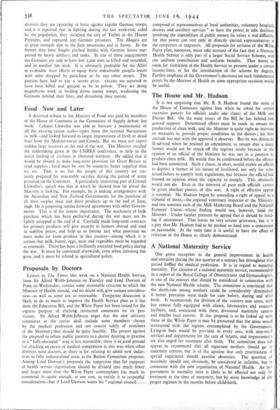Food—Now and Later
A deserved tribute to the Ministry of Food was paid by members of the House of Commons in the Committee of Supply debate last week. Colonel Llewellin was able to forecast a maintenance of all the existing ration scales—apart from the seasonal fluctuations in milk—and looked forward to larger importations of fresh or dried fruit from the Mediterranean and Canada. But we must not expect sudden large increases at the end of the war. The Minister recalled the undertaking given at the UNRRA conference, to help in the initial feeding of civilians in liberated territory. He added that it would be absurd to make long-term provision for Great Britain to send supplies ; food must be sent by countries better supplied than we arc. That is so, but the people of this country are cer- tainly prepared for reasonable sacrifice during the period of acute privation on the Continent. A particularly interesting part of Colonel Llewellin's speech was that in which he showed how far ahead the Ministry is looking. For example, he is making arrangements with the Australian and New Zealand Governments for the purchase of all their surplus meat and dairy products up to the end of June, 1948. He is proposing similar forward agreements with other Govern- ments. This is of the utmost importance. The machinery of bulk purchase which has been perfected during the war must not be • lightly scrapped at the end of it. Carefully made long-term contracts for primary products will give security to farmers abroad and tend to stabilise prices, and help us to foresee just what provision we must make for farm produce in this country—among which it is certain that milk, butter, eggs, meat and vegetables must be regarded as essentials. There has been a brilliantly executed food policy during the war. It must be continued afterwards, even when rationing has gone, and it must be related to agricultural policy.


























 Previous page
Previous page